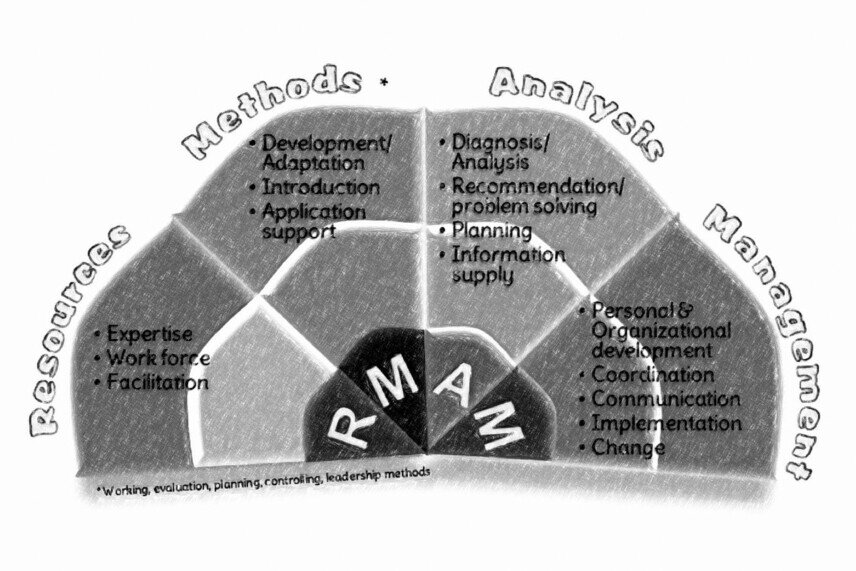Consulting portfolio
Consulting services are individually tailored and differ case by case. Additionally, each consultancy defines its service portfolio. This general consulting portfolio allows the comparison of consulting services and companies.
The following model is organized into four areas: resources, methods, analysis, and management.

- Resources
Content-oriented consultation offers supplies like expertise, workforce, and facilitation, i.e., the provision of resources. It can be selected by branch, function, or process. Dependent on the topic, the offers are technology-, administration- or service-oriented operations, e.g., information technology, human resources, hotline management. Essentially capacity bottlenecks of the customer are compensated with external resources or continuous outsourcing.
- Methods
Methodical consultation supplies and/or develops locally required knowledge, approaches, and structures jointly with the customer. It is about development/ adaptation, introduction and application support of methods, e.g., time management, reporting system, project management, governance, and leadership methods. The development of method competence increases internal efficiency, avoids the loss of core competencies, and supports ‚help for self-help’.
- Analysis
Evaluation-oriented consultation provides creative, content-oriented support by a neutral third party. It concerns diagnosis/ analysis, recommendations/ problem solving, planning, and information supply. Results are certifications and benchmarks and recommendations, solutions, project plans, and research documentation, e.g., ISO9000-certifications, IT-benchmarks, solution alternatives for decision-making or future scenarios. This provides generally accepted certifications and branch knowledge and neutral evaluations and external creativity by an independent third party.
- Management
Management consultation covers personal and organizational development, coordination, communication, implementation, and change management. It is a holistic consultation that combines content-oriented, methodical, and evaluation-oriented services and extends through personal coaching of individuals and groups. Key areas are any changes that individuals, teams, and organizations have to cope with concerning their context, actions, capabilities, convictions, roles, and affiliation. This can take place as workshops, significant events, communication, and other change-related activities. Technocratic, reason-driven management approaches reached their limits since they ignore the human soft factors involved. Therefore, more and more efforts occur to look at daily business life holistically as a system, more as a living organism than a wheelwork with defined cogwheels. Appropriate consulting services are available in change management, e.g., systemic organizational consulting, learning organization, single and team coaching.
The model enables the positioning and presentation of core areas that are delivered by consulting services and firms.

